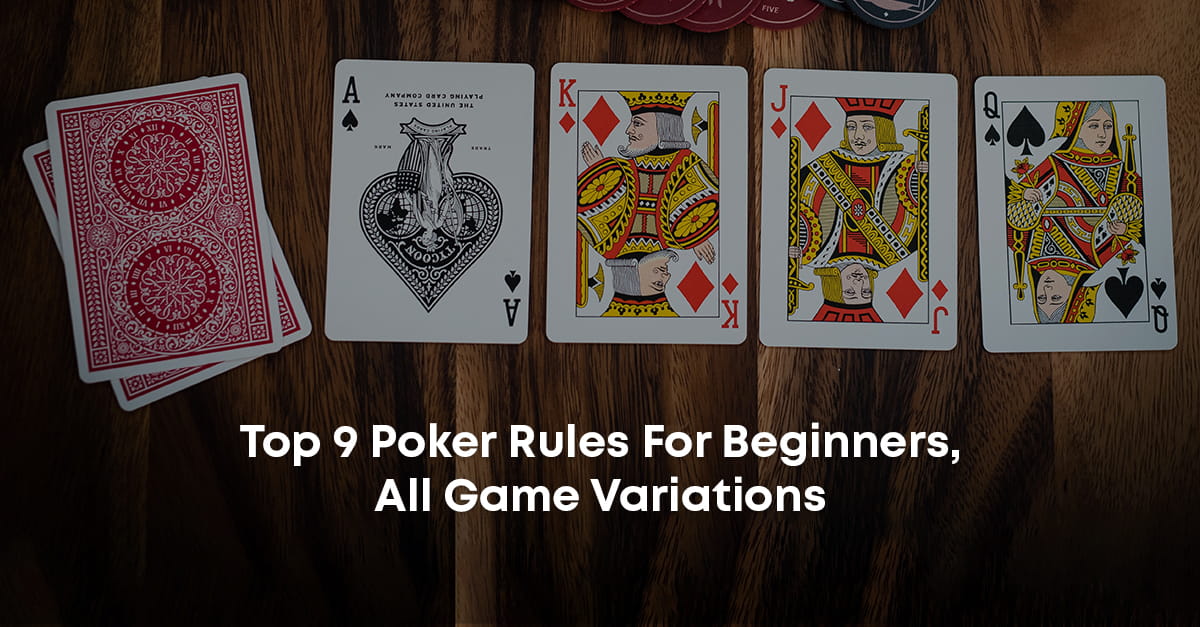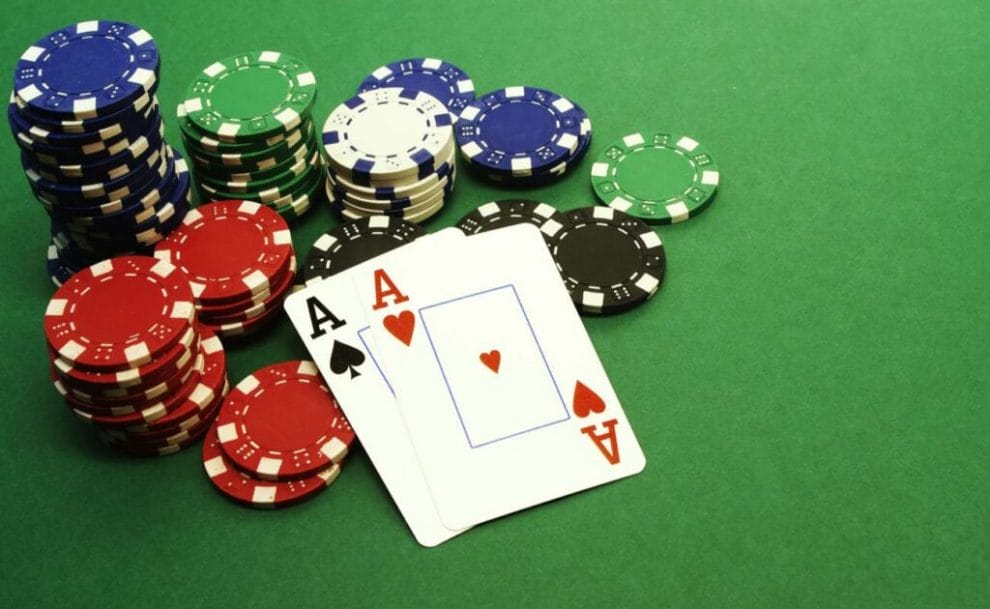tl;dr: Poker for beginners entails learning the fundamental rules, hand rankings, and basic strategies to start playing this popular card game.
If you’re new to the world of poker, this article is your ultimate guide to getting started. Whether you’re interested in playing poker at a casino, with friends, or online, we’ll cover everything you need to know. From understanding the basics of the game to essential strategies and tips, this article will help you become a confident poker player. So, let’s dive in and learn all about poker for beginners.

9 fundamental poker rules for beginners:
- Hand Rankings: Learn the hierarchy of poker hands, from high card to a royal flush, to understand the value of your hand.
- Blinds and Antes: Familiarize yourself with the forced bets (blinds or antes) that kickstart the betting in each hand.
- Betting Rounds: Understand the different betting rounds (pre-flop, flop, turn, and river) and the actions available during each round.
- Community Cards: Know the common cards dealt face-up on the table that all players can use to form their hand.
- Hole Cards: Learn about the private cards dealt to each player, which are used in combination with the community cards to make the best hand.
- Winning the Pot: Comprehend the ways to win a poker hand – either by having the best hand at showdown or by bluffing others into folding.
- Check, Bet, Raise, Fold: Understand the basic actions in poker – checking, betting, raising, and folding – and when to use them strategically.
- Showdown: Recognize when a showdown occurs, where players reveal their hands, and the best hand wins the pot.
- Poker Etiquette: Respect poker etiquette, such as acting in turn, not revealing your hand early, and maintaining a pleasant and fair gameplay atmosphere.
Understanding the basics of poker
The objective of the game
The objective of poker is to win chips or money by forming the best hand or by convincing your opponents to fold. In most poker variants, a hand consists of five cards, and the player with the highest-ranking hand at the end of the game wins the pot.
The different types of poker
There are numerous variations of poker, but the most popular ones include Texas Hold’em, Omaha, Seven-Card Stud, and Five-Card Draw. Each variant has its own set of rules and gameplay, so it’s essential to choose the one that suits your preferences and skill level.
The ranking of hands
Before diving into a game of poker, it’s crucial to understand the ranking of hands. The highest-ranking hand is the Royal Flush, followed by Straight Flush, Four of a Kind, Full House, Flush, Straight, Three of a Kind, Two Pair, One Pair, and High Card. Familiarize yourself with these hand rankings to make informed decisions during gameplay.
Getting started with poker

Choosing the right poker variant
When starting out, it’s recommended to begin with Texas Hold’em as it’s the most popular and widely played variant. It offers a good balance of strategy and simplicity, making it ideal for beginners. As you gain experience, you can explore other variants and find the one that suits your style.
Learning the rules and terminology
To play poker effectively, you must familiarize yourself with the rules and terminology. Learn about the different actions such as check, bet, raise, and fold. Understand terms like blinds, community cards, and pot. This knowledge will help you navigate the game with confidence.
Understanding the importance of position
Position is a crucial aspect of poker. It refers to where you are seated at the table relative to the dealer. The later your position, the more information you have about your opponents’ actions, allowing you to make better decisions. Pay attention to your position and use it to your advantage.
Essential poker strategies for beginners

Starting hand selection
One of the most critical aspects of poker strategy is selecting the right starting hands. Avoid playing too many hands and focus on starting with strong hands like high pairs, suited connectors, and high-value cards. This will increase your chances of winning.
Knowing when to fold
Folding is an essential skill in poker. Don’t be afraid to fold if your hand is weak or the odds are against you. It’s better to preserve your chips for stronger hands rather than risking them on a losing hand.
Understanding pot odds and outs
Pot odds and outs are fundamental concepts in poker. Pot odds help you determine whether a call is profitable based on the size of the pot and the cost of the bet. Outs are the cards that can improve your hand. Understanding these concepts will help you make informed decisions and maximize your chances of winning.
Managing your bankroll
Bankroll management is crucial for long-term success in poker. Set a budget for your poker games and stick to it. Avoid playing with money you can’t afford to lose. Additionally, consider playing at lower stakes when starting out to minimize risk and gain experience.
Improving your poker skills

Practice and play regularly
The more you play poker, the better you’ll become. Practice regularly to refine your skills and gain experience. Consider playing with friends or joining local poker clubs to enhance your gameplay.
Study and learn from experienced players
Learning from experienced players is a great way to improve your poker skills. Watch tutorials, read books, and follow online forums to gain insights and strategies from seasoned players. Analyze their gameplay and incorporate their techniques into your own.
Review and analyze your gameplay
After each session, take the time to review and analyze your gameplay. Identify your strengths and weaknesses, and work on improving them. Keep track of your wins and losses to identify patterns and adjust your strategies accordingly.
Participate in low-stakes tournaments
Low-stakes tournaments are an excellent way for beginners to gain tournament experience without risking a significant amount of money. Participate in these tournaments to practice your skills, learn from other players, and build your confidence.
Tips for playing poker online

Choosing a reputable online poker site
When playing poker online, it’s crucial to choose a reputable and trustworthy poker site. Look for sites with a good reputation, secure payment options, and a wide range of games. Read reviews and do thorough research before signing up.
Understanding online poker etiquette
Online poker has its own set of etiquette rules. Be respectful to other players, avoid abusive language, and follow the site’s rules and guidelines. Treat online players with the same courtesy you would in a live game.
Managing your online poker bankroll
Just like in live poker, bankroll management is essential when playing online. Set a budget for your online poker games and stick to it. Avoid chasing losses and be disciplined with your bankroll to ensure a positive and enjoyable experience.
Utilizing online poker tools and resources
Take advantage of the various online poker tools and resources available. These tools can help you analyze your gameplay, track your progress, and provide valuable insights and strategies. Use them to enhance your skills and stay ahead of the competition.
Conclusion

Poker is an exciting and challenging game that offers endless possibilities. By understanding the basics, learning essential strategies, and continuously improving your skills, you can become a successful poker player. Remember to choose the right variant, practice regularly, and manage your bankroll wisely. Whether you’re playing at a casino or online, poker for beginners is an adventure waiting to be explored. So, gather your chips, sharpen your skills, and get ready to embark on an exhilarating poker journey. Good
FAQ
-
What is the easiest poker game for beginners?
Five Card Draw Considered one of the simplest forms of poker, five card draw starts with each player receiving five cards. After the initial deal, players can choose up to three cards to trade in exchange for new cards. The player with the best five-card combination wins.
-
How can a beginner be good at poker?
1. Understand the value of your hand.
2. Understand position.
3. Bluff intelligently.
4. Make your bluffs look just like legitimate bets.
5. Know when to fold, be willing to get bluffed, and screw hope.
6. Force yourself to be aggressive when you have the cards.
7. Understand your opponents.
8. Understand the value of pocket pairs. -
How hard is it to learn poker?
Poker is a simple game to learn, but the poker rules can be challenging for a complete beginner. But don’t let that put you off. It is not hard to learn how to play poker, and you can move from the basics of the game to the tables of the top online poker sites in no time.
Originally posted 2023-10-01 15:29:19.


Thanks for the tips. I just learned how to play Poker last week.
@PedroNiz: Great to know that you learned something here.